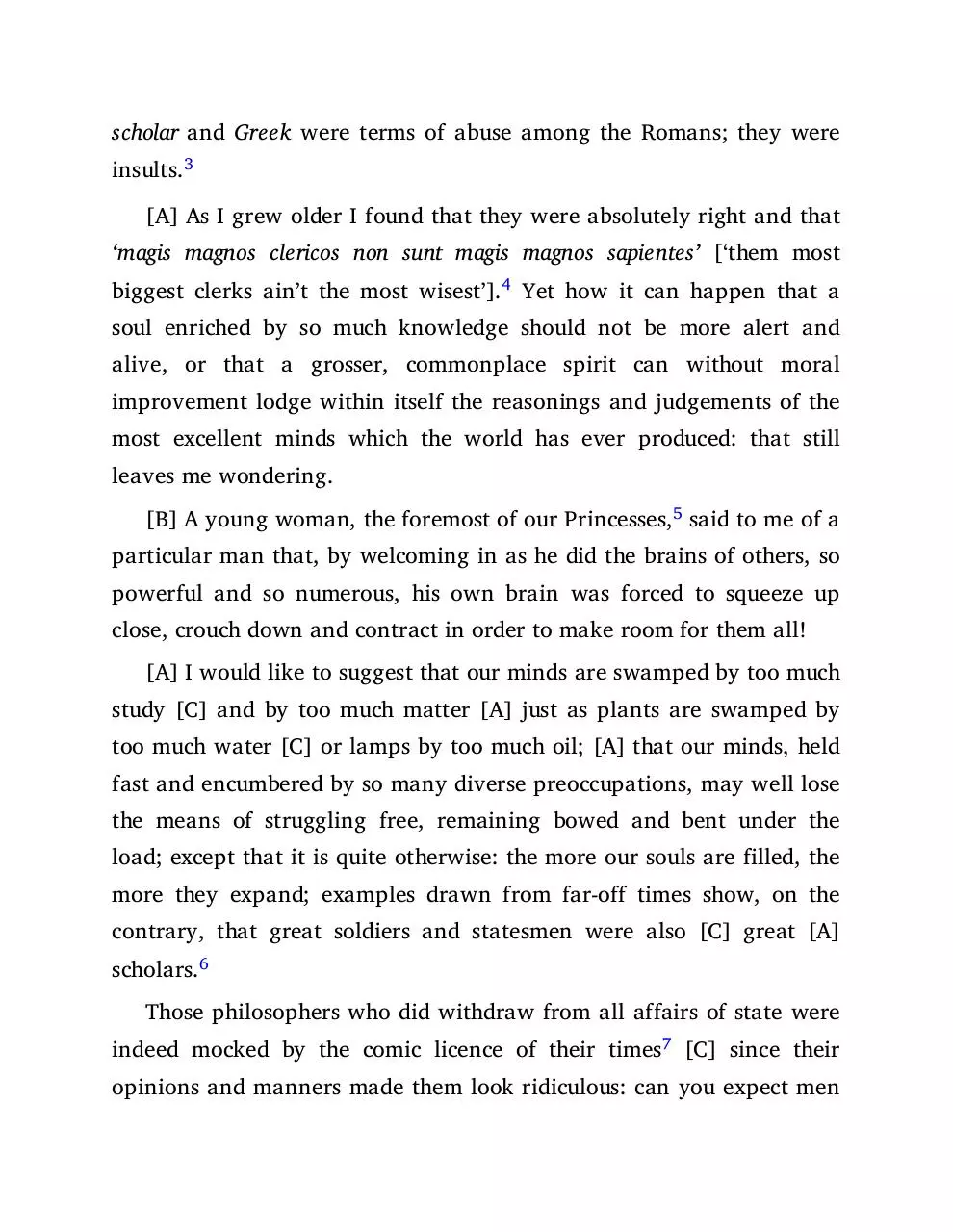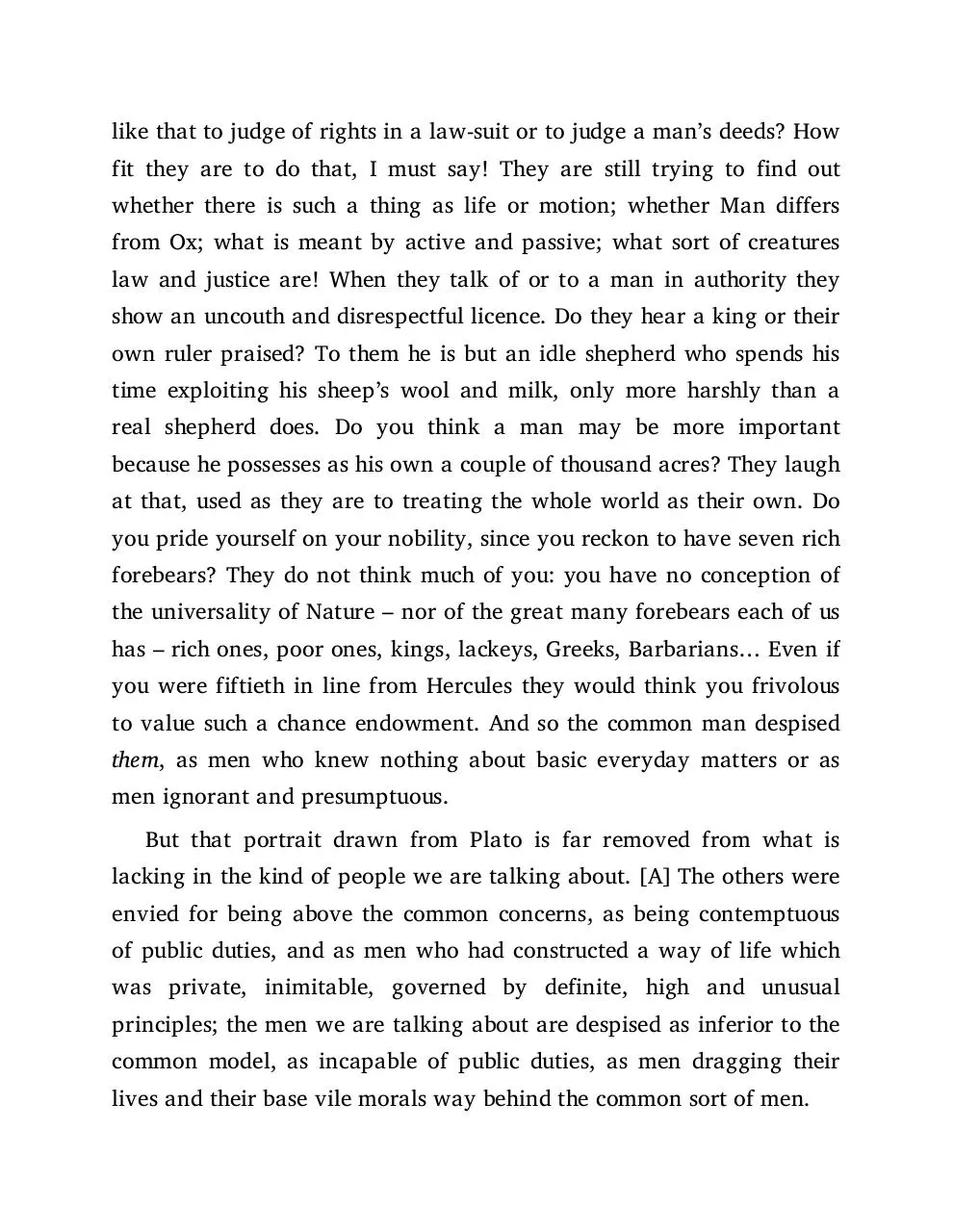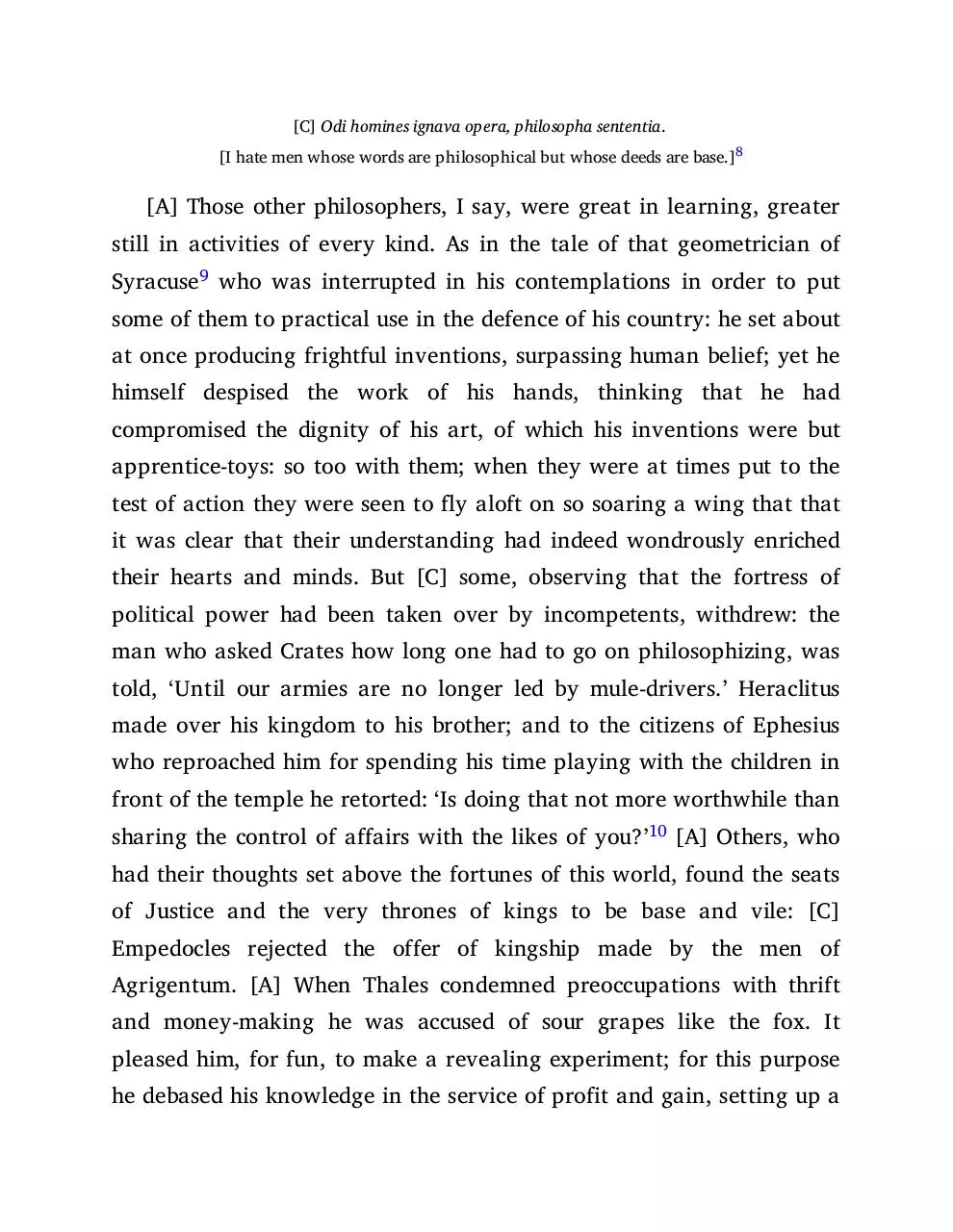selection (PDF)
File information
Title: The Complete Essays
Author: Michel de Montaigne
This PDF 1.4 document has been generated by calibre 2.85.1 [https://calibre-ebook.com] / 3-Heights(TM) PDF Security Shell 4.8.25.2 (http://www.pdf-tools.com) / pdcat (www.pdf-tools.com), and has been sent on pdf-archive.com on 16/02/2018 at 08:12, from IP address 50.0.x.x.
The current document download page has been viewed 567 times.
File size: 157.84 KB (17 pages).
Privacy: public file





File preview
25. On schoolmasters’ learning
[This chapter – Du Pédantisme in French – is not limited to what we mean by pedantry today. Its
main butt was originally dominees and dons who may impress the young but are parrots unfitted for
real life; they know things off by rote but are not wise; they resemble the sophists mocked in Antiquity
rather than true philosophers who, even then, were laughed at (but for reasons which did them
honour). The later editions, especially [C], emphasize that true philosophers are an elite who know
the limits of their knowledge.
Montaigne, writing consciously as a gentleman, partly has in mind Baldassari Castiglione’s Book of
the Courtier, which was written in Italian for Francis I of France as a means of making his court more
elegant.
The unnamed German who taught Montaigne to speak Latin as his first language was Albert
Horstanus, some of whose letters have been preserved (cf. Hartmann, Amerbach-korrespondenz, IX –
2, p. 504).]
[A] when I was a schoolboy I was often upset when I saw
schoolmasters treated as buffoons in Italian comedies – (and among us
French the title of Magister can scarcely be said to imply much more
respect).1 Placed as I was under their control and tutelage, the least I
could do was to be jealous of their reputation. I tried to make excuses
for them in terms of the natural conflict between the common man and
men of rare judgement and outstanding learning – an inevitable one
since their courses run flat opposite to each other. But the effort was
wasted: it was the most civilized of men who held them in the greatest
contempt; witness our excellent Du Bellay:
Mais je hay par sur tout un sçavoir pédantesque.
[But most of all I loathe schoolmasterish erudition.]2
[B] This attitude goes back to the Ancients: for Plutarch says that
scholar and Greek were terms of abuse among the Romans; they were
insults.3
[A] As I grew older I found that they were absolutely right and that
‘magis magnos clericos non sunt magis magnos sapientes’ [‘them most
biggest clerks ain’t the most wisest’].4 Yet how it can happen that a
soul enriched by so much knowledge should not be more alert and
alive, or that a grosser, commonplace spirit can without moral
improvement lodge within itself the reasonings and judgements of the
most excellent minds which the world has ever produced: that still
leaves me wondering.
[B] A young woman, the foremost of our Princesses,5 said to me of a
particular man that, by welcoming in as he did the brains of others, so
powerful and so numerous, his own brain was forced to squeeze up
close, crouch down and contract in order to make room for them all!
[A] I would like to suggest that our minds are swamped by too much
study [C] and by too much matter [A] just as plants are swamped by
too much water [C] or lamps by too much oil; [A] that our minds, held
fast and encumbered by so many diverse preoccupations, may well lose
the means of struggling free, remaining bowed and bent under the
load; except that it is quite otherwise: the more our souls are filled, the
more they expand; examples drawn from far-off times show, on the
contrary, that great soldiers and statesmen were also [C] great [A]
scholars.6
Those philosophers who did withdraw from all affairs of state were
indeed mocked by the comic licence of their times7 [C] since their
opinions and manners made them look ridiculous: can you expect men
like that to judge of rights in a law-suit or to judge a man’s deeds? How
fit they are to do that, I must say! They are still trying to find out
whether there is such a thing as life or motion; whether Man differs
from Ox; what is meant by active and passive; what sort of creatures
law and justice are! When they talk of or to a man in authority they
show an uncouth and disrespectful licence. Do they hear a king or their
own ruler praised? To them he is but an idle shepherd who spends his
time exploiting his sheep’s wool and milk, only more harshly than a
real shepherd does. Do you think a man may be more important
because he possesses as his own a couple of thousand acres? They laugh
at that, used as they are to treating the whole world as their own. Do
you pride yourself on your nobility, since you reckon to have seven rich
forebears? They do not think much of you: you have no conception of
the universality of Nature – nor of the great many forebears each of us
has – rich ones, poor ones, kings, lackeys, Greeks, Barbarians… Even if
you were fiftieth in line from Hercules they would think you frivolous
to value such a chance endowment. And so the common man despised
them, as men who knew nothing about basic everyday matters or as
men ignorant and presumptuous.
But that portrait drawn from Plato is far removed from what is
lacking in the kind of people we are talking about. [A] The others were
envied for being above the common concerns, as being contemptuous
of public duties, and as men who had constructed a way of life which
was private, inimitable, governed by definite, high and unusual
principles; the men we are talking about are despised as inferior to the
common model, as incapable of public duties, as men dragging their
lives and their base vile morals way behind the common sort of men.
[C] Odi homines ignava opera, philosopha sententia.
[I hate men whose words are philosophical but whose deeds are base.]8
[A] Those other philosophers, I say, were great in learning, greater
still in activities of every kind. As in the tale of that geometrician of
Syracuse9 who was interrupted in his contemplations in order to put
some of them to practical use in the defence of his country: he set about
at once producing frightful inventions, surpassing human belief; yet he
himself despised the work of his hands, thinking that he had
compromised the dignity of his art, of which his inventions were but
apprentice-toys: so too with them; when they were at times put to the
test of action they were seen to fly aloft on so soaring a wing that that
it was clear that their understanding had indeed wondrously enriched
their hearts and minds. But [C] some, observing that the fortress of
political power had been taken over by incompetents, withdrew: the
man who asked Crates how long one had to go on philosophizing, was
told, ‘Until our armies are no longer led by mule-drivers.’ Heraclitus
made over his kingdom to his brother; and to the citizens of Ephesius
who reproached him for spending his time playing with the children in
front of the temple he retorted: ‘Is doing that not more worthwhile than
sharing the control of affairs with the likes of you?’10 [A] Others, who
had their thoughts set above the fortunes of this world, found the seats
of Justice and the very thrones of kings to be base and vile: [C]
Empedocles rejected the offer of kingship made by the men of
Agrigentum. [A] When Thales condemned preoccupations with thrift
and money-making he was accused of sour grapes like the fox. It
pleased him, for fun, to make a revealing experiment; for this purpose
he debased his knowledge in the service of profit and gain, setting up a
business which in one year brought in as much wealth as the most
experienced in the trade were hard put to match in a lifetime.11
[C] Aristotle tells of some people who called Thales, Anaxagoras
and their like wise but not prudent, in that they did not concern
themselves enough with the more useful matters;12 I cannot easily
swallow that verbal distinction, but apart from that it provides no
excuse for the people I am talking about: judging from the base and
needy lot they are satisfied with, they are both not wise and not
prudent.
[A] But leaving aside this first explanation, I think it is better to say
that the evil arises from their tackling the sciences in the wrong
manner and that, from the way we have been taught, it is no wonder
that neither master nor pupils become more able, even though they do
know more. In truth the care and fees of our parents aim only at
furnishing our heads with knowledge: nobody talks about judgement or
virtue. When someone passes by, try exclaiming, ‘Oh, what a learned
man!’ Then, when another does, ‘Oh, what a good man!’ Our people
will not fail to turn their gaze respectfully towards the first. There
ought to be a third man crying, ‘Oh, what blockheads!’13
We readily inquire, ‘Does he know Greek or Latin?’ ‘Can he write
poetry and prose?’ But what matters most is what we put last: ‘Has he
become better and wiser?’ We ought to find out not who understands
most but who understands best. We work merely to fill the memory,
leaving the understanding [C] and the sense of right and wrong [A]
empty. Just as birds sometimes go in search of grain, carrying it in
their beaks without tasting it to stuff it down the beaks of their young,
so too do our schoolmasters go foraging for learning in their books and
merely lodge it on the tip of their lips, only to spew it out and scatter it
on the wind.
[C] Such foolishness fits my own case marvellously well. Am I for
the most part not doing the same when assembling my material? Off I
go, rummaging about in books for sayings which please me – not so as
to store them up (for I have no storehouses) but so as to carry them
back to this book, where they are no more mine than they were in their
original place. We only know, I believe, what we know now: ‘knowing’
no more consists in what we once knew than in what we shall know in
the future.
[A] But what is worse, their pupils and their little charges are not
nourished and fed by what they learn: the learning is passed from hand
to hand with only one end in view: to show it off, to put into our
accounts to entertain others with it, as though it were merely counters,
useful for totting up and producing statements, but having no other use
or currency. [C] ‘Apud alios loqui didicerunt, non ipsi secum’ [They have
learned how to talk with others, not with themselves]: ‘Non est
loquendum, sed gubemandum.’ [We do not need talk but
helmsmanship.]14
Nature, to show that nothing beneath her sway is really savage, has
brought forth among peoples whom art has least civilized things which
rival the best that art can produce. There is a Gascon proverb, drawn
from a country flute-song, which has just the right nuance for my
purpose: ‘Bouha prou bouha, mas a remuda lous ditz qu’em.’ [‘Puff and
blow as you will: what concerns us is the movement of the fingers.’]
[A] We know how to say, ‘This is what Cicero said’; ‘This is morality
for Plato’; ‘These are the ipsissima verba of Aristotle.’ But what have we
got to say? What judgements do we make? What are we doing? A
parrot could talk as well as we do.15
Such behaviour puts me in mind of a rich Roman who had, at great
expense, taken care to obtain the services of experts in all branches of
learning;16 he kept them always about him so that, when some topic or
other should happen to come up when he was with friends, each would
bring supplies to his market, ready to furnish him with a brace of
arguments or a verse bagged from Homer, depending on what kind of
game they traded in. He thought that that knowledge was his because it
was in the heads of people who were in his pay – as is the case of those
men whose learned abundance consists in owning sumptuous libraries.
[C] Whenever I ask a certain acquaintance of mine to tell me what
he knows about anything, he wants to show me a book: he would not
venture to tell me that he has scabs on his arse without studying his
lexicon to find out the meanings of scab and of arse.
[A] All we do is to look after the opinions and learning of others:
we ought to make them our own. We closely resemble a man who,
needing a fire, goes next door to get a light, finds a great big blaze
there and stays to warm himself, forgetting to take a brand back
home.17 What use is it to us to have a belly full of meat if we do not
digest it, if we do not transmute it into ourselves, if it does not make us
grow in size and strength? Do we imagine that Lucullus, whom reading,
not experience, made [C] and fashioned [A] into so great a captain,
treated reading as we do?18 [B] We allow ourselves to lean so heavily
on other men’s arms that we destroy our own force. Do I wish to fortify
myself against fear of death? Then I do it at Seneca’s expense. Do I
want to console myself or somebody else? Then I borrow from Cicero: I
would have drawn it from my own resources if only I had been made to
practise doing so. I have no love for such competence as is borne off
and begged.
[A] Learned we may be with another man’s learning: we can only
be wise with wisdom of our own:
[I hate a sage who is not wise for himself.]19
[C] ‘Ex quo Ennius: Nequicquam sapere sapientem, qui ipse sibi
prodesse non quiret’ [Hence what Ennius said: ‘That Sage is in no way
wise who seeks not self-improvement’]…
[B] … Si cupidus, si
Vanus et Euganea quantumvis vilior agna
[If he is avaricious and vain, or scraggier than a ewe in Euganea];
[C] ‘Non enim paranda nobis solum, sed fruenda sapientia est.’ [‘We
must not only obtain Wisdom: we must enjoy her.’]20 Dionysius used to
laugh at professors of grammar who did research into the bad qualities
of Ulysses yet knew nothing of their own; at musicians whose flutes
were harmonious but not their morals; at orators whose studies led to
talking about justice, not to being just.21
[A] If our souls do not move with a better motion and if we do not
have a healthier judgement, then I would just as soon that our pupil
should spend his time playing tennis: at least his body would become
more agile. But just look at him after he has spent some fifteen or
sixteen years studying: nothing could be more unsuited for
employment. The only improvement you can see is that his Latin and
Greek have made him more conceited and more arrogant than when he
left home. [C] He ought to have brought back a fuller soul: he brings
back a swollen one; instead of making it weightier he has merely
blown wind into it.
These Magisters (as Plato says of their cousins, the Sophists) are
unique in promising to be the most useful of men while being the only
ones who not only fail to improve what is entrusted to them (yet
carpenters or masons do so) but actually make it worse. And then they
charge you for it.22
Were we to accept the terms put forward by Protagoras23 – that
either he should be paid his set fee or else his pupils should declare on
oath in the temple what profit they reckoned they had gained from
what he had taught them and remunerate him accordingly – these
pedagogues of mine would be in for a disappointment if they had to
rely on oaths based upon my experience.
[A] In my local Périgord dialect these stripling savants are
amusingly called Lettreferits (‘word-struck’), as though their reading has
given them, so to speak, a whack with a hammer. In truth, as often as
not they appear to have been knocked below common-sense itself.
Take a peasant or a cobbler: you can see them going simply and
innocently about their business, talking only of what they know:
whereas these fellows, who want to rise up [C] and fight [A] armed
with knowledge which is merely floating about on the surface of their
Download selection
selection.pdf (PDF, 157.84 KB)
Download PDF
Share this file on social networks
Link to this page
Permanent link
Use the permanent link to the download page to share your document on Facebook, Twitter, LinkedIn, or directly with a contact by e-Mail, Messenger, Whatsapp, Line..
Short link
Use the short link to share your document on Twitter or by text message (SMS)
HTML Code
Copy the following HTML code to share your document on a Website or Blog
QR Code to this page

This file has been shared publicly by a user of PDF Archive.
Document ID: 0000735017.